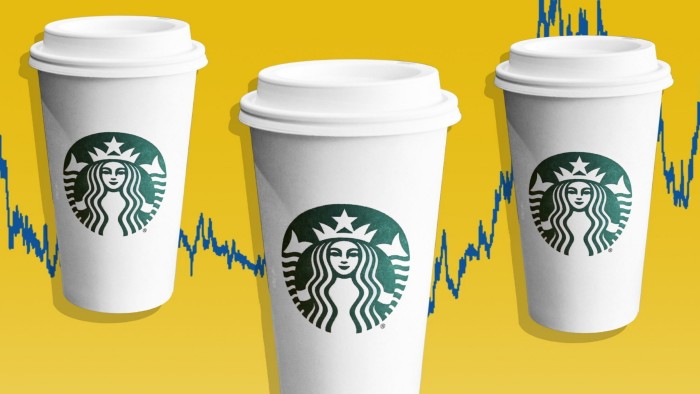Starbucks has slashed its use of hedges against coffee price shocks even as the price of beans has soared, raising concerns that it may be unusually exposed to market swings.
The world’s largest café chain held less than $200mn worth of fixed-price contracts for so-called green, or unroasted, coffee at the end of its fiscal year in September, according to its newly filed annual report, down from $1bn as recently as 2019.
The decline has occurred at a time when roasters confront supply deficits after persistently poor crops in major exporters such as Brazil. Benchmark coffee futures rose above $3 a pound in New York on Friday to a 13-year high, following a more than 70 per cent gain in the past 12 months.
Starbucks buys 3 per cent of the world’s coffee to supply its 40,000 cafés and retail businesses. A team based in Lausanne, Switzerland manages purchasing high-quality arabica beans under a subsidiary named the Starbucks Coffee Trading Company. The decline in the value of its fixed-price contracts has attracted attention on Wall Street.
“They are substantially less hedged than they used to be. It makes the next 12 months of coffee prices more important than they’ve ever been,” said Gregory Francfort, a restaurant analyst at Guggenheim Securities.
New Starbucks chief executive Brian Niccol is in the the early stages of a plan to revive flagging sales at cafés. One of his goals is to restore its appeal as a community coffee house. “At Starbucks, coffee comes first,” he said in video remarks last month.
The company is not alone among roasters in letting price-cover slip during an explosive market rally. Data from the US commodity futures regulator shows commercial traders have sharply reduced their contracts to buy arabica.
A coffee trader familiar with Starbucks’ operations says the majority of its purchases are made with so-called “price-to-be-fixed” contracts, which establish a quantity, delivery month and the amount of price premium to New York’s futures market. The final purchase price is agreed later.
“When a market rallies significantly and quickly, as coffee has done, the roasting community in general tends to let coverage decline,” the trader said.
Starbucks’ 56 “tier one” suppliers range from global commodities trading houses such as Louis Dreyfus and Olam to farmer co-operatives. The company in 2021 said it bought 800mn lbs of coffee annually — an amount that would cost $2.4bn at current benchmark prices.
Starbucks had $1.1bn in green coffee purchase obligations on its books as of September, according to its annual report.
The company buys green coffee using two types of contracts: fixed-price and price-to-be-fixed, according to its annual report. For the latter, the company also uses derivatives contracts to insure against market gyrations.
“Like others, right now we’re remaining agile in a very dynamic market,” Starbucks said in response to questions. “An example of that agility is that our current priced coverage is slightly lower than our typical range of 9-18 months.”
Starbucks executives rarely discuss coffee hedging with Wall Street, but in 2021 — another period of furious price rises — then-CEO Kevin Johnson told analysts the company purchased 12 to 18 months in advance, and at the time had locked in prices for the next 14 months.
“We may be the only large buyer of green coffee that uses this approach, and that will serve us well as it gives us a significant advantage relative to our competitors who, if they don’t buy this far in advance, will certainly not have that cost structure that we put in place,” he said.
The value of Starbucks’ price-to-be-fixed contracts has fluctuated, ending the fiscal year in September at $929mn, according to the annual report.
That sum was more than a year ago, but well below levels of 2021 and 2022. Coffee derivatives contracts held by Starbucks were worth $154mn, the lowest September value since 2020.
Starbucks’ coffee trading operation is headed by Andres Berron, an eight-year employee of the company, according to his LinkedIn page. The company declined to make him available for comment.
Starbucks said its approach to purchasing coffee hasn’t changed. The company pointed out that its current stocks of physical coffee are a cushion against volatility in the spot market.
Inventories of unroasted and roasted beans combined were worth about $920mn as of September, according to the annual report, the lowest fiscal year-end figure since 2021.
“We keep a healthy and ample green coffee inventory that outpaces other roasters,” Starbucks said.
Global coffee production has been rocked by poor weather. The US Department of Agriculture last week cut its production forecast for Brazil, the top supplier, citing irregular rainfall and high temperatures that could depress its next harvest.
“The global coffee market just can’t seem to catch a break,” said Kona Haque, a commodities analyst at ED&F Man in London. “Just when you think maybe this year we’re going to get a big crop and finally get back to a surplus and rebuild our stocks, you get another adverse-weather event in either Brazil or Vietnam, and things get tight again.”
“Because markets now are tighter than usual, there is upward pressure on prices,” she added. “In a rising price environment, clearly you want to be hedged. You do not want to be exposed to rising spot prices.”
Read the full article here

